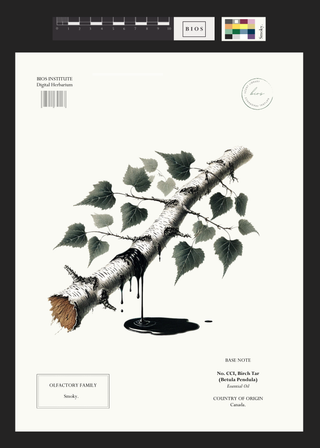

Birch tar (Betula pendula) is a substance derived from the bark of the birch tree through a process called dry distillation. It has a strong, smoky, and tar-like scent and is used in perfumery for its unique aromatic qualities. Betula pendula, commonly known as silver birch, is native to various parts of Europe and Asia. Its native range includes countries such as Finland, Sweden, Norway, Russia, and other regions in Northern and Central Europe. Silver birch is known to thrive in colder climates and is a common tree species in many European forests. It has also been introduced and cultivated in other parts of the world due to its aesthetic appeal and environmental benefits. Our birch tar is sourced from Canada, where it's been introduced and thrives. It is appreciated for its elegant appearance, distinctive bark, and light foliage. Silver birch is often planted in parks, gardens, and urban landscapes throughout Canada for its ornamental value.
Birch tar has a distinctive scent characterized by smoky, woody, leathery, and sometimes phenolic notes. It can evoke the smell of campfires, leather, and the great outdoors. The intensity and character of the scent can vary depending on the method of extraction and the specific birch species used.
Birch tar is used as a base note in perfumery to add depth, complexity, and a touch of ruggedness to fragrances. It is found in our Smoky family and is often used in compositions that aim to evoke earthy, smoky, or leathery atmospheres. It can also provide an interesting contrast or counterpoint to sweeter or more floral notes.
Birch tar's smoky and woody scent profile is often associated with masculine fragrances. It can contribute to the creation of bold, robust, and assertive scents that exude strength and masculinity. It is commonly used in men's fragrances and in compositions that aim to capture a sense of ruggedness or adventure.
It's worth noting that birch tar is a potent material with a strong aroma, and its use in perfumery requires careful blending and moderation to achieve the desired effect. Its smoky and tarry scent can be polarizing, and some people may find it challenging or too intense. However, for those who appreciate its unique character, birch tar can add depth, complexity, and an evocative quality to perfumes.
In some cultures, birch tar has been used in traditional medicine for its perceived healing properties. It has been used topically as an antiseptic, for treating skin conditions like eczema or psoriasis, and as a remedy for joint pain or inflammation.
Birch tar has been used in rituals and ceremonies in certain indigenous cultures. For example, in some Native American traditions, birch tar has been used in smudging ceremonies, purification rituals, or as an offering to spirits or ancestors.
Birch tar has been used in various traditional crafts. For instance, in Northern European cultures, it has been used to treat and waterproof leather goods like shoes or bags. It has also been used as a binding agent in the creation of paints or pigments for cave art or other artistic expressions.
Birch trees, from which birch tar is derived, hold cultural symbolism in some societies. They can represent resilience, renewal, purification, or protection. Birch tar, as a product of the birch tree, may carry some of these symbolic associations.
Birch tar has a long history of use in various cultural practices. It has been used as an adhesive, a sealant, or a component of tools or construction materials. It has also been used to preserve and protect wooden objects or structures.
Birch Tar
- Unit price
- /per
Please note this product format is a small vial that contains roughly 20 drops of scent concentrate. This can be purchased à la carte but is intended to be used with our Perfume Kit.
SCENT SPECIFICATIONS
Latin Name: Betula Pendula
Extraction Method: Dry Distilled
Country of Origin: Canada
All of the scents in our library are naturally derived - our collection includes essential oils, absolutes, concretes, isolates, enfleurage, macerations, oleoresins, and mixed medium naturals.
Adding product to your cart
Birch tar (Betula pendula) is a substance derived from the bark of the birch tree through a process called dry distillation. It has a strong, smoky, and tar-like scent and is used in perfumery for its unique aromatic qualities. Betula pendula, commonly known as silver birch, is native to various parts of Europe and Asia. Its native range includes countries such as Finland, Sweden, Norway, Russia, and other regions in Northern and Central Europe. Silver birch is known to thrive in colder climates and is a common tree species in many European forests. It has also been introduced and cultivated in other parts of the world due to its aesthetic appeal and environmental benefits. Our birch tar is sourced from Canada, where it's been introduced and thrives. It is appreciated for its elegant appearance, distinctive bark, and light foliage. Silver birch is often planted in parks, gardens, and urban landscapes throughout Canada for its ornamental value.
Birch tar has a distinctive scent characterized by smoky, woody, leathery, and sometimes phenolic notes. It can evoke the smell of campfires, leather, and the great outdoors. The intensity and character of the scent can vary depending on the method of extraction and the specific birch species used.
Birch tar is used as a base note in perfumery to add depth, complexity, and a touch of ruggedness to fragrances. It is found in our Smoky family and is often used in compositions that aim to evoke earthy, smoky, or leathery atmospheres. It can also provide an interesting contrast or counterpoint to sweeter or more floral notes.
Birch tar's smoky and woody scent profile is often associated with masculine fragrances. It can contribute to the creation of bold, robust, and assertive scents that exude strength and masculinity. It is commonly used in men's fragrances and in compositions that aim to capture a sense of ruggedness or adventure.
It's worth noting that birch tar is a potent material with a strong aroma, and its use in perfumery requires careful blending and moderation to achieve the desired effect. Its smoky and tarry scent can be polarizing, and some people may find it challenging or too intense. However, for those who appreciate its unique character, birch tar can add depth, complexity, and an evocative quality to perfumes.
In some cultures, birch tar has been used in traditional medicine for its perceived healing properties. It has been used topically as an antiseptic, for treating skin conditions like eczema or psoriasis, and as a remedy for joint pain or inflammation.
Birch tar has been used in rituals and ceremonies in certain indigenous cultures. For example, in some Native American traditions, birch tar has been used in smudging ceremonies, purification rituals, or as an offering to spirits or ancestors.
Birch tar has been used in various traditional crafts. For instance, in Northern European cultures, it has been used to treat and waterproof leather goods like shoes or bags. It has also been used as a binding agent in the creation of paints or pigments for cave art or other artistic expressions.
Birch trees, from which birch tar is derived, hold cultural symbolism in some societies. They can represent resilience, renewal, purification, or protection. Birch tar, as a product of the birch tree, may carry some of these symbolic associations.
Birch tar has a long history of use in various cultural practices. It has been used as an adhesive, a sealant, or a component of tools or construction materials. It has also been used to preserve and protect wooden objects or structures.
